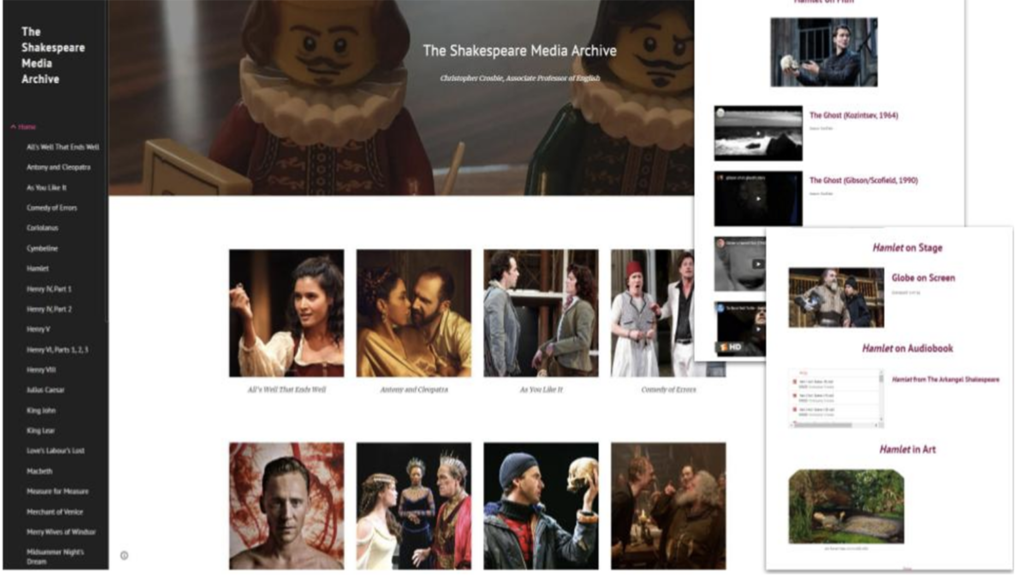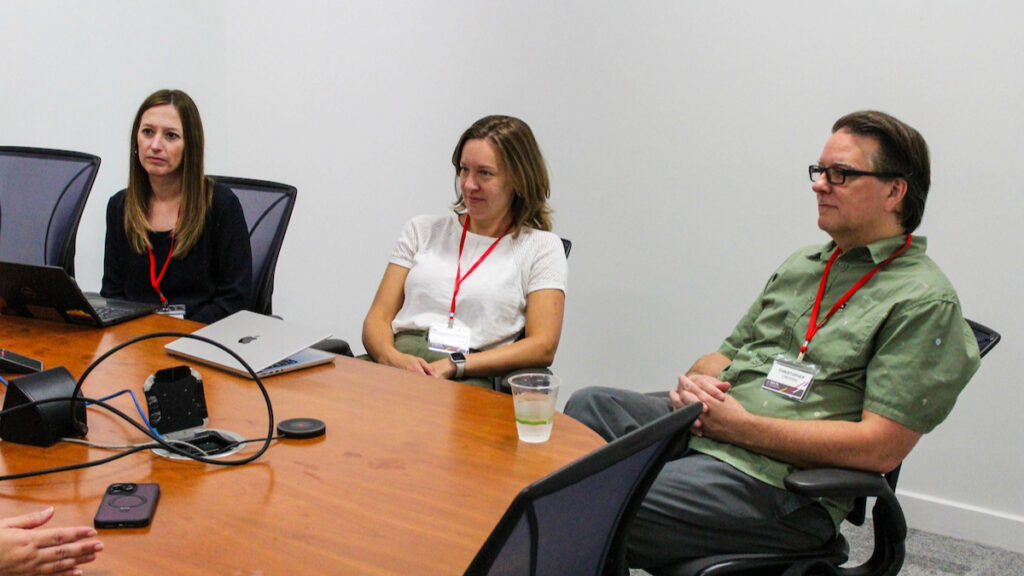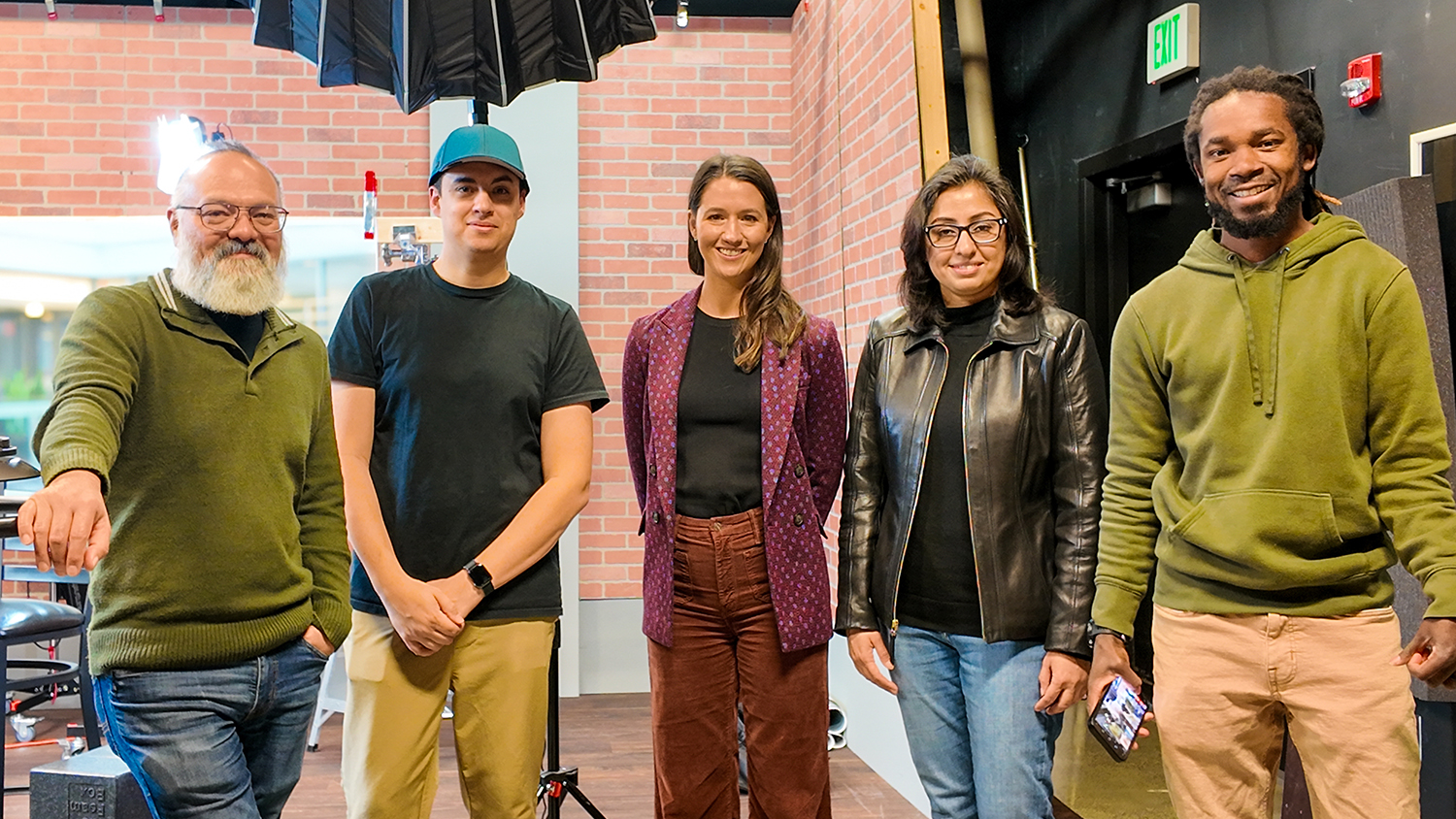Studying the humanities, advocates for liberal arts education say, teaches students to become more critical thinkers, better global citizens and stronger communicators. It trains them to engage deeply with texts, history, culture, languages and human civilizations. And, it sparks curiosity, inspires boundary-pushing and creates communities.
New DELTA Faculty Fellow Christopher Crosbie fully agrees. “Humanities programs matter, and they need to be kept vital,” he said. “It’s crucial for people from all economic backgrounds and all walks of life to have access to great books, great art and skilled educators excited to share and discuss these things.”
An associate professor in the Department of English in the College of Humanities and Sciences at NC State, Crosbie is one of three new and three returning Faculty Fellows for the 2024-2025 academic year. Faculty Fellows partner with DELTA staff to develop pedagogically innovative course content that is scalable and reproducible for instructors across the university.
Over the course of the yearlong grant, Faculty Fellows may lead campus workshops, share best practices in academic articles, present at conferences such as DELTA-Con and the Conference on Faculty Excellence, or engage in other scholarly activities.
A specialist in Shakespeare and other dramatists of the English Renaissance, Crosbie’s research explores the intersection of classical and early modern philosophies and performative possibilities in modern theatrical productions. “Old texts matter — they contain some of the best of human thought, and they survive because there are great things in them that are always worth revisiting,” he said. “That knowledge and wisdom thrives when it extends beyond the walls of the individual classroom.”
Crosbie strives to make Shakespeare accessible, engaging and meaningful to all of the students in his classes — and beyond the classroom walls to anyone interested.
“I love the range of students we have at NC State, coming as they do from such diverse backgrounds and with so many varied interests,” he said. “I enjoy in equal measure the students who want to go on for more intensive work in Shakespearean studies and those who pass through my introductory classes on the way to careers in the sciences, public service and the like.”
Leveraging Instructional Tools to Foster Community
Crosbie first partnered with DELTA on a 2022 Instructional Tools Express Grant, for which he and the DELTA project team used Google Apps for Education to create the Shakespeare Media Archive, a comprehensive, public-facing multimedia Google site. Crosbie collects performances of Shakespeare’s plays, poems and related materials to use in classroom teaching and as a resource for fellow instructors.

“I’ve found that a carefully curated mix of audio, visual and interactive aids greatly improves comprehension, retention, and, most crucially, enjoyment of the content I teach,” Crosbie said. “As a centralized hub for a wide range of performances, it’s designed to provide easy access for specific scenes when teaching or studying Shakespeare’s works.”
Google apps for education, including Google Sites, are part of NC State’s suite of enterprise instructional technology tools supported by DELTA. Google tools are popular for their ease of use, customizability, accessibility and security features.
Following a Tweet about his new Shakespeare site, Crosbie was pleasantly surprised by the flood of positive feedback and interest he received from colleagues at NC State and beyond.
“I originally envisioned this site as a repository for ad hoc teaching materials, such as specific remedial content,” he explained. “I discovered that other instructors were using the resource in their courses and that the site was the catalyst for collaborative student engagement.”
In his role as a DELTA Faculty Fellow, Crosbie is using this work as the foundation from which to share his insights and inform similar projects.
“This is a time of technological flux — upheaval, really — in both the humanities and teaching,” Crosbie said. “In the post-COVID era, and with the rise of generative AI, many students find this a very alienating, isolating time. As a Faculty Fellow, I hope to leverage tech to help alleviate that alienation and to, somewhat paradoxically, return us to more direct conversations with each other.”
Making the Old New Again
One of Crosbie’s favorite uses of instructional technology is sharing with his students past performances of the plays and poems they are studying. This is made possible, in part, through the university library’s acquisition and maintenance of three comprehensive databases of Shakespearean performances: Shakespeare’s Globe on Screen, the National Theatre Collection and the Stratford Festival. These databases are freely available to NC State students, faculty and staff.

“To many, Shakespeare’s plays feel unreadable, at least at first,” Crosbie said. “But these are scripts — lines for actors to interpret and deliver. The performances housed in our library’s databases, along with those I’ve collected on my teaching site, help the scripts come alive and really foster connection to the material.”
Crosbie has taught at NC State since 2008 as a core member of the English faculty. He founded the campus group Shakespeare at State to foster community among Shakespeare enthusiasts and created the Friends of Shakespeare fund to offset the cost of attending live theater for NC State students.
“Shakespeare’s plays are all about community,” he explained. “People in his time, as they do in ours, converged to watch plays together, then talk about them. And the plays themselves are all about how communities cohere or collapse — and why that is.”
It delights Crosbie to hear of his students independently accessing the library databases, either for other courses or personal enrichment.
“My teaching career here has been a sequence of lively, ongoing conversations with a vibrant community of my own as we collectively work through Shakespearean texts to think about our own times and our sense of purpose in the world,” he said.
As well as fostering community, Crosbie hopes to use his Fellowship to discover, master and disseminate new instructional tools that highlight the essential work done by teaching scholars in the humanities. Alongside English Department colleagues and DELTA Faculty Fellows Paul Fyfe and Anna Gibson, Crosbie conducts research from an interdisciplinary perspective informed by digital research, also known as digital humanities.
He points to Gibson’s efforts to help students connect with one another in online learning environments using social annotation tools, particularly Perusall, as an excellent example of the collaborative approach his fellow English instructors employ in the classroom.
“NC State’s English Department continually inspires with the original work, in research and in teaching, produced by my colleagues,” Crosbie said. “They are such a robust, active group of teaching scholars who are always innovating.”

Like Crosbie, many Faculty Fellows have previously partnered with DELTA on grant projects that inspired them to share their new knowledge or technical ability. Crosbie sees such knowledge-sharing as not just beneficial but necessary, given NC State’s mission as a land grant institution.
“In the wake of the devastation caused by Hurricane Helene, we have mutual obligations to people not only locally but also across the state,” he said. “Finding ways to learn from each other and to share pedagogical insights that have worked well for us could multiply the impact we have through our work.”
Luckily, he continued, DELTA is ready to pick up that mantle. “The range of expertise available through our colleagues in DELTA is invaluable.”
About DELTA Faculty Fellowships
Our Faculty Fellows Grants program champions innovative technological pedagogy by fostering the exchange of ideas and interdisciplinary partnerships among NC State faculty with support from DELTA staff. The grant work specifically focuses on incorporating NC State enterprise technology tools into classes, such as Moodle, Zoom, Google Apps for Education and Panopto.
For instructors of all kinds of courses, the DELTA Grants program offers solutions to a variety of pedagogical challenges, from analyzing a golf swing to interactive flash cards and gamification of learning modules. Explore some of DELTA’s innovative solutions to instructional challenges.
Whether leading workshops on NC State’s campus, sharing best practices via articles or presenting at conferences, DELTA Faculty Fellows are constantly improving and innovating.
Interested in sharing your knowledge and learning from other instructors? Apply for a Faculty Fellows Grant during the next application cycle!



